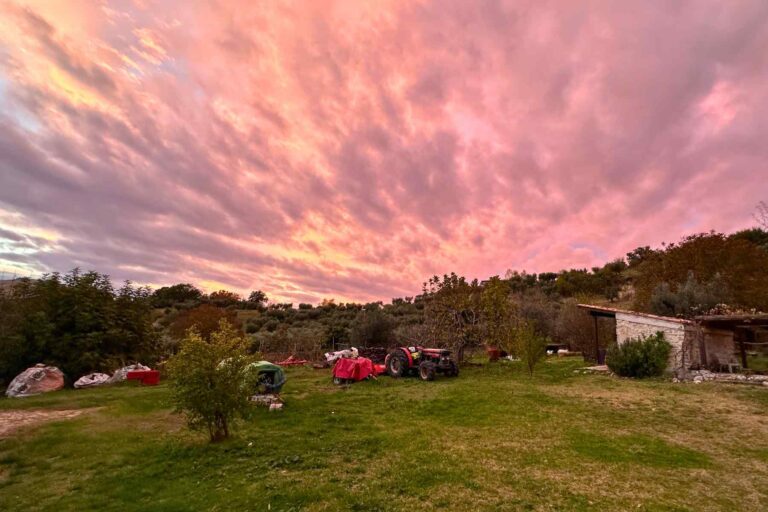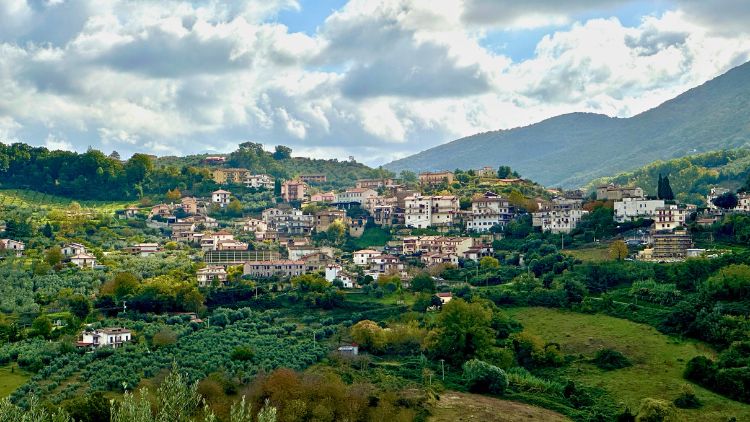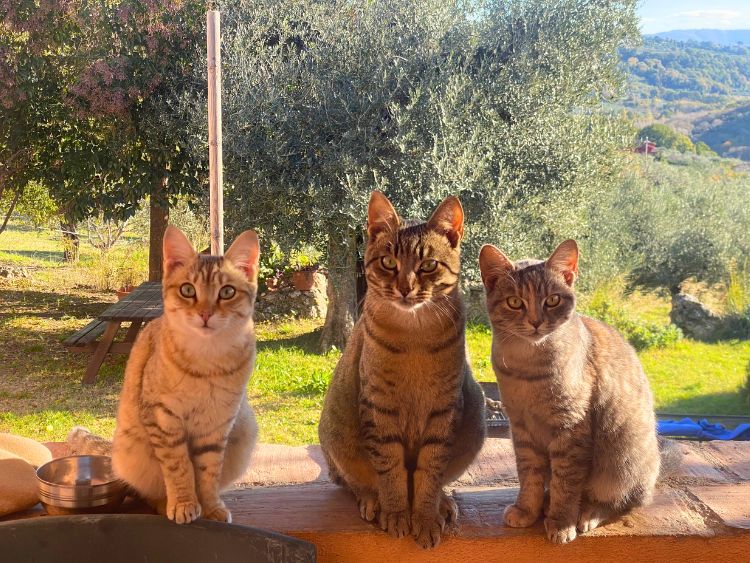
We are reader-supported and may earn a commission on purchases made through links in this article.
It took a whole week for us to master the delicate and dangerous art of feeding two gluttonous 200-pound hogs, a skill that came with a steep learning curve. Making the slop was the easy part, even when the grain was nowhere to be found and our Workaway host family wasn’t contactable.
The hardest part was leaping over an electric fence into a cesspool of mud and urine, fighting for our lives to get to the troughs, and dumping the appetizing mix in before getting mauled.
I had romanticized pigs my entire life believing that they were adorable, underrated creatures – and some may be if raised differently. But big fat farm hogs are a different breed, designed with the sole purpose of biting the hand that feeds them and making one’s ears bleed from their satanic squeals.
Regardless of spawning from the depths of hell, sometimes their cute little snorts were rather charming and their mud-covered snouts made me swoon. They never ceased to lure me like the melodic sirens in Odysseus, knowing without a doubt they would chew me to pieces if they had the chance.
After all, this is what I signed up for. To live on a small farm in rural Italy for two weeks while the hosts were on vacation – with the responsibility of caring for five cats (three of which were kittens), one dog, two horses, five (soon four) chickens, and of course two hogs. What could possibly go wrong?
Prefer audio? This story is also available as a podcast discussion – listen here.
First of All, What is Workaway?
Workaway may be one of the most revolutionary budget travel concepts to exist. When I first heard about the idea, I was giddy for weeks and spent most of my spare time scrolling the endless volunteer opportunities (some are even paid) that they have all around the world.
Similar to a work exchange program, it is an extensive database that pairs hosts with volunteers. Specific conditions are set up by each host family including what they’re offering, what kind of help they’re looking for, and other logistics. Most host families offer accommodation and board in exchange for 4-5 hours of work per day.
The database is highly searchable by location, length of stay, internet connection and a variety of other helpful filters. They even have a way to search for hosts that enjoy hosting digital nomads – so you can even work during your stay.
The best part is that the vast majority of opportunities are entirely cost-free (although, it’s worth noting that Workaway does require an annual subscription fee – details to follow).
You can choose to volunteer on your own, search for options where you can meet other Workawayers, or volunteer with your loved ones. I roped my poor boyfriend into joining me on my Italian farm adventure, exposing a side to my insanity that fortunately he tolerated swimmingly.
My Workaway Experience

Having volunteered on a couple of family farms before, I wanted my first Workaway experience to be farm-centric. Aside from my routine problem of idealizing different jobs, I felt like I could actually handle a farm because I love animals and because I had a job spending hours alone tending to grapevines in a Michigan vineyard.
This particular farm was located 50 minutes outside of Rome in a small town called Toffia. With gorgeous mountains decorated with olive trees and lush greenery, it was such an idyllic escape. We arrived two days before the owners left, so we could learn the ropes and get settled. The farmhouse was cozy and humble with a beautiful view of the villages across the valley.
Francesco and Bijaya, the wonderful couple who hosted us, provided us with fresh pasta made from the grain they grew with with vegetables plucked from the vegetable garden.
I love that it is part of Italian culture to prioritize fresh, high-quality food. Francesco mostly sells grains and olive byproducts to the local towns. We helped bottle olive oil during the first two days and were embarrassingly bad at it, spilling oil all over the place. We also showcased our ADHD by forgetting to turn off the hoses a little too often which concerned our hosts.
Finally, when we got the hang of everything, they left and we had the full place to ourselves.
The Early Days

Within the first hour of the first day, my boyfriend, Jimmy, started to brew a pot of coffee and left it to go take care of the animals. I woke up about 20 minutes later to the smell of burning plastic and smoke flooding the house.
To my horror, the plastic parts of the coffee pot melted onto the stove and all the contents burned, rendering the pot (and thankfully not us) dead. I rushed to get Jimmy who felt incredibly guilty and our plan was to try to hunt down a replacement in Toffia.
It was a 45-minute walk to and from Toffia, uphill both ways. Toffia was a beautiful town that probably sees one tourist a year if that. There were no restaurants at all or really anything for that matter besides a small bar and a grocery store which was closed each time we went, causing immense frustration and limiting us to only eating Francesco’s stash of potatoes and any vegetables we could find in the garden. We consumed an entire bag of potatoes during our stay out of mere necessity.
What didn’t help was the fact that two needy animals were doing everything they could to come to the market with us, a problem that took us about an hour to remedy. Like Tom Cruise from Mission Impossible, Jimmy herded the dog and cat into the garage and rolled under the garage door as I closed it, right before the animals tried to squeeze their way out.
And after all that, the grocery store was closed that day anyway. And we never found a coffee pot.
Our Main Task, Feeding the Animals

Our primary job was to feed all 15 of the animals in the morning and the evening, something we thought would be a piece of cake. We were sorely mistaken.
In the time that we were there, we had a pig that reeked of impatience bust through the electric fence to let us know how hungry it was. Terrified of these monsters, we strategically lured it back in with some slop and grass. The pigs were by far the most difficult creatures to take care of.
The cats were the second most high maintenance, mostly due to their aggressive neediness. We were followed around all day long serenaded by their little meows. The kittens in particular needed a lot of attention and love but we didn’t mind because they were so sweet. They never bit or scratched us unlike Yoda the dog.
Feeding them was a chore because some cats would get more than others and we had to continually keep the dog from eating their food. We also spent a significant amount of time trying to wrangle these creatures and keep them out of the house (they weren’t allowed inside).
Chickens, However, Are the Toughest to Wrangle
There were four chickens and one rooster all kept inside a coop. The rooster was a new addition to the household, plagued by a nasty attitude and overwhelming amounts of testosterone. We didn’t once observe this rooster treating his roommates with respect which became hard to watch.
A few days into our stay, we found a pile of feathers in the corner of the coop, which we soon realized was a chicken pecked to death by the rooster. On top of all of the other mistakes and struggles we had along the way, the last thing we wanted to report back was that one of their chickens was killed on our watch.
We knew we had to do something about this rooster before he harmed anyone else. The hosts advised us to chuck the carcass of the dead chicken far into the woods (for the foxes and coyotes) and to let the rooster out to wander. They said it’s normal for him to move into the neighboring coop on his own after sunset. They luckily weren’t upset about the death of the chicken. After all, they were farmers and this kind of thing happens all the time.
The next challenge was trying to let the rooster out without all the chickens escaping, one we miserably failed at. Two chickens took their opportunity to bolt out leading Jimmy and me on a wild chicken chase that lasted a couple of hours.
The rooster never did return to the coop like we were told, so yet again we looked everywhere on the property, praying that he too wasn’t killed. We were cockadoodledooing like maniacs becoming more and more desperate the darker it got. A couple of hours later, we found him at the top of the highest tree on the property, right next to the house. How he got up there will forever remain a mystery.
Other Delightful Obstacles

Before Francesco and Bijaya left, wild boars were mentioned in passing. Apparently, it isn’t too uncommon to encounter a couple of these creatures on the property. Boars are no joke. I remember learning about how dangerous they can be and after dealing with the horrors of these so-called domesticated pigs, I could only imagine.
Jimmy and I took turns taking the trash out and doing the dishes each night. The trash in Italy is divided into what feels like a thousand categories (cardboard, glass, paper, metal, plastic, regular trash, etc.) Categories were taken out on different days of the week (basically every night). This wouldn’t be too much of a problem if the trash “spot” wasn’t so far away.
One night, when it was Jimmy’s turn to bring the trash out, he encountered a herd of 20-30 wild boars, snorting away. Petrified, he knew his only option was to walk slowly back to the house, luckily with Yoda by his side for protection. If I was in that scenario, I probably would’ve climbed a tree and stayed there for the night.
Our Final Day

The next day, Francesco and Bijaya returned and we broke the news about the coffee pot and all the other ridiculous things that happened. As the cherry on top, when Francesco took us to the train station, we saw the trash Jimmy took out completely demolished by the boars.
Also, they don’t have any semblance of a dumpster – you literally just place the bags on a ledge. Perhaps a real dumpster with a lid that closes would prevent animals from tearing up the trash but what do I know?
We left on a good note with our host family, even though we brought chaotic energy to their farm. But what I learned is that farms are chaotic in general and that they are difficult but rewarding to maintain. I know that I will always miss those animals.
Would I want to own a farm one day? No. Not at all. I would volunteer on them again merely for the experience of it. One of the coolest parts about Workaway is that you can try a variety of experiences without committing to making them your life.
The Many Redeeming Moments

We spent our free time relaxing in the sun outside, plucking ticks out of kittens (my boyfriend’s specialty), cooking the freshest food using ingredients straight from the garden (Courtesy of the boyfriend as well. Boyfriends sometimes come in handy).
I also was able to get a lot of work done during the visit, so it certainly is possible to be a digital nomad while doing a Workaway. We grew stronger as a couple and enjoyed a gorgeous slice of Italy we probably would have never seen otherwise.
So at the End of the Day – Would I Recommend Workaway?
Absolutely yes. So much so that I already have two other adventures planned, this time with a dear friend of mine. It is hands down the best way to travel on a budget and experience something you would never expect.
Reasons to Do Workaway
There are endless amounts of reasons to try out Workaway for yourself. Beyond it being an amazing experience, it is a great opportunity for a cultural exchange.
- Amazing Cultural Exchange: Simply visiting a country and hitting all the tourist spots is a great way to travel, but if you want true cultural immersion, nothing is better than living with locals and learning their ways of life.
- Budget Travel: Aside from transportation costs to Rome, and buying a few additional groceries, we didn’t spend anything for the two weeks we lived in Toffia. You could travel endlessly on a budget if you stack up a bunch of volunteer opportunities like this.
- Learning Opportunity: No matter what Workaway opportunity you choose, I can guarantee that you will learn something. Whether that be a new skill, a new culture, and/or, a new lifestyle, learning is inevitable if you try out Workaway.
Workaway FAQs
Read More:
- NOAD, the Digital Nomad’s Dream Housing Swap Service
- A Rooster, a Yurt and a Sunrise: Glamping in Arizona
- 5 Ways to Find an Affordable Room for the Night
- 5 Questions: How to Do a Home Exchange While Traveling
- Summer in Cherry Creek North: Denver’s Upscale Urban Oasis - June 26, 2025
- Switzerland Bucket List: 10 Epic Adventures You Can’t Miss - June 17, 2025
- 10 Best Places to Spend the Fourth of July in the USA - June 16, 2025

